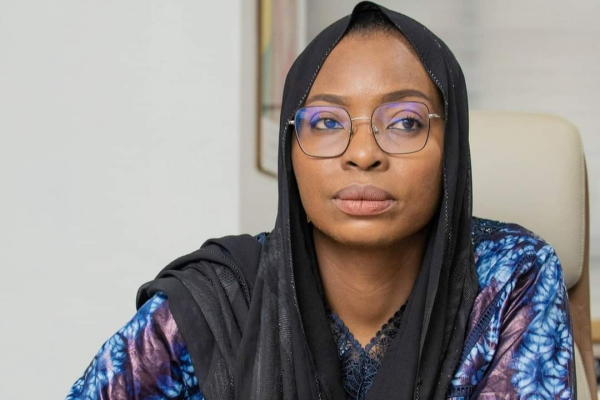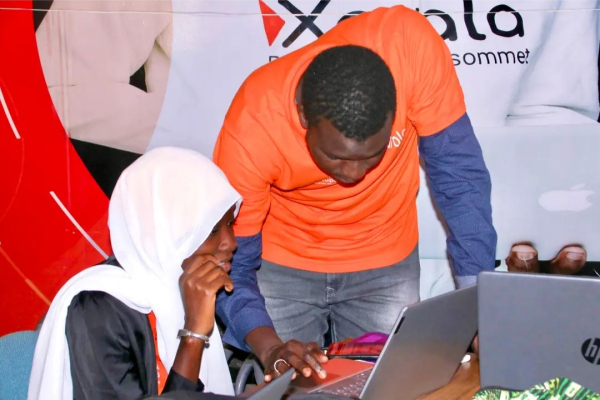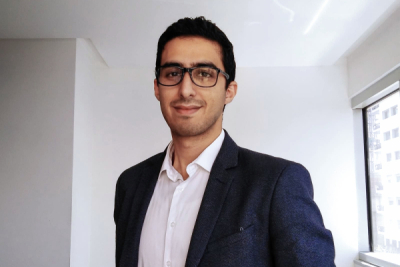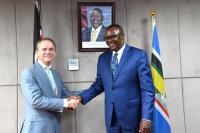Since it arrived in Guinea in 2006, Huawei has contributed to the implementation of various digital projects. In the years to come, the government would like to benefit from its expertise once again.
The Republic of Guinea is turning to Huawei for assistance with several digital initiatives. On April 5, Rose Pola Pricemou (photo), the Minister of Posts, Telecommunications, and the Digital Economy, met with a delegation from Huawei in Guinea to discuss potential collaborations aimed at bolstering the nation’s digital infrastructure and fostering technological advancement.
The projects under discussion include training for those involved in computer systems modernization services (SMSI), strengthening the backbone, implementing the Guinea Safe City program, expanding Internet coverage to underserved rural areas, and organizing ICT Girls’ Day on April 25.
These initiatives, for which Guinea is seeking Huawei’s support, form a crucial part of the National Digitisation Strategy’s implementation, which aims to modernize the country’s administration and key sectors. Huawei has been a long-standing partner in this process, having been operational in the country since 2006. The company has spearheaded numerous projects, including the construction of 4,000 km of fiber optic cable, thereby contributing to the development of Guinea’s communications infrastructure.
With recent financial backing of $60 million from the World Bank, the Guinean government is hoping to ramp up its efforts in collaboration with Huawei. The government’s primary digital projects currently include the construction of a digital village, extension of the national fiber optic network, connection to new international fiber optic submarine cables, launch of the public telecommunications company Guinée Télécom, digitization of the administration and various public services, and provision of Internet connectivity to 300 schools and some universities.
Samira Njoya
Following his IT training, tech entrepreneur Ousseynou Diop embarked on a mission to make IT training accessible to those seeking new opportunities. His startup has introduced training programs designed to meet the continent's needs amidst the rapid digital transformation.
Xarala Academy, an e-learning solution developed by a Senegalese startup, offers training in various information and communication technology areas through its web and mobile platforms. The startup, established in 2017 by Ousseynou Diop and based in Pikine, derives its name “xarala” from the Wolof language, meaning “technology”.
"We firmly believe that education has the power to transform - not just individuals, but entire communities and nations. Our vision is rooted in the belief that every African talent trained is one step closer to a better future, where technology is a lever for improving lives," says Ousseynou Diop.
The Xarala Academy mobile application, available on iOS and Android, allows users to access a variety of edtech courses after creating an account. These courses cover areas such as web and mobile development, cybersecurity, design, digital marketing, and project management, typically lasting twelve weeks.
The courses are designed for beginners, with the belief that the twelve-week period is sufficient to acquire the necessary skills in the chosen field. The startup does not require any specific level of education to access its courses, making them accessible to anyone who can read and write.
Xarala Academy, accessible 24/7, has over 6,000 learners on its web and mobile platforms. The Android version of its mobile application has been downloaded more than a thousand times, according to the Play Store.
Adoni Conrad Quenum
E-health provides much-needed services in Africa, particularly by extending healthcare provision to regions where health workers are scarce. However, challenges persist, including the need for better coordination of various initiatives.
The International Committee of Digital Health Experts in Africa (CEISNA) has partnered with the Higher Institute of Public Health in Bamako, Mali, to improve the country’s healthcare systems, according to an announcement made on April 6.
"In a country facing major health challenges, the involvement of the senior management of Mali's Institute of Public Health in this collaboration is not only remarkable but essential. This partnership clearly illustrates Mali's determination to promote the well-being of its population through digital innovation in health," says CEISNA in a press release.
The collaboration will see the implementation of targeted initiatives to strengthen local capacities, expand access to quality care, and leverage modern technology to serve the Malian population better. The partnership also plans to foster a synergy of expertise to stimulate the development of innovative digital health solutions, promote knowledge sharing, and launch projects aimed at transforming healthcare access in Mali.
The partnership aligns with the joint commitment of CEISNA and the Institut Supérieur de Santé Publique de Bamako to enhance Mali’s healthcare systems through digital technology. This comes as Mali is in the process of overhauling its healthcare system, with the National Strategic Plan for Digital Health 2024-2028 approved last December.
The collaboration is expected to herald a new era in the collective effort towards sustainable development and the promotion of public health in Africa, ultimately contributing significantly to the well-being of the people of Mali and the wider region.
Samira Njoya
With a decade of fintech experience, she has held numerous roles of responsibility. Her accomplishments have been recognized with awards and shared with fellow female entrepreneurs from Africa, Europe, and Canada.
Aïssatou Ami Touré (photo), the 35-year-old Managing Director of Yassir Sénégal, has been named the winner of the Margaret Awards 2024 in the African Intrapreneur category. The award was presented at a ceremony in Paris, France, on March 11, organized by Digital Women’s Day (JFD), which champions women’s creativity, innovation, and audacity in the digital sector.
Touré, who has been at the helm of the startup since May 2022, is developing a digital wallet within the company, which operates a super-application for booking taxis and delivering mail and parcels. The wallet, currently at the Proof of Concept stage, is designed to help users manage their budget and control their spending. The long-term goal is to extend the solution to other partners, particularly in the retail sector.
With this financial solution, Touré aims to improve consumer satisfaction regarding access to transport and food products and encourage widespread adoption of the digital platform in Senegal. Her work reflects her commitment to technological innovation and financial inclusion in Africa.
Touré, who has over a decade of experience in fintech, holds a bachelor’s degree in business administration with a major in finance from Suffolk University in Boston, and a master’s degree in science with a major in finance from NEOMA Business School. She began her career at Orabank Senegal in 2011.
She joined Tigo Cash, Tigo Senegal’s mobile financial services department, as a product manager in May 2013. In February 2014, she was promoted to Customer Operations Supervisor, and Director of Operations in June 2015. During her tenure at Tigo Cash, she developed professional procedures that were crucial in obtaining licenses to issue electronic money.
In December 2016, Touré joined Ecobank Senegal as Head of Mobile Banking, and was promoted to Head of Remittances and Mobile Banking in February 2018, a position she held until May 2022. Her dedication to financial inclusion has led her to advise and support start-ups looking to enter the field of digital finance, contributing to a more dynamic and accessible financial ecosystem.
As a recipient of the Margaret Prize, Touré will benefit from various JFD programs designed to support the growth and international influence of startups and entrepreneurial initiatives led by women from Europe, Africa, and Canada.
Trained as a computer scientist, she aims to optimize the monitoring of children by their parents and schools. Supported by the Orange Group, she continues to develop her business across Africa.
Sayouri Soukaina (photo), a computer scientist by training and the founder of Schoolify, leads its Moroccan division with a mission to enhance school monitoring for schools, students, and parents.
Established in 2021, Schoolify provides a suite of management solutions for schools, encompassing school monitoring, administrative management, geolocation, and real-time tracking of school transportation. The platform empowers school administrations to manage all school services online, maintain comprehensive student records, and facilitate constant communication with parents.
Schoolify offers students an online educational space that integrates all school-related activities, including lessons, exercises, schedules, canteen services, grades, and periodic reviews. The application also provides a comprehensive overview of all school activities, including report cards and textbooks.
In 2017, Soukaina also co-founded Sotinor, a communications agency where she serves as CEO. Sotinor assists entrepreneurs in conducting precise business diagnostics, enhancing profitability, and making informed strategic decisions.
Soukaina, a Moroccan national, earned a degree in computer engineering in 2014 from the Agadir Polytechnic in Morocco and a master’s degree in computer science in 2015 from the University of Lorraine in France. In 2019, she joined the StartOn program by Orange and received two years of support. She launched Schoolify at the end of this program.
“Thanks to the support from Orange’s StartOn, I was able to market my product ,‘Schoolify’, in [...] four countries in Africa. As for the support program, I’m in the process of gaining solid knowledge and expertise, thanks to our coaches. Not to mention the fact that I’ve built a robust customer portfolio,” Soukaina explains.
Melchior Koba
He aims to help maintain a healthy environment and make life easier for Moroccan travelers. An entrepreneur specializing in mobility, he has received several awards for the impact of his solution.
Hicham Zouaoui (photo), a Moroccan entrepreneur and computer scientist, is the co-founder and CEO of Pip Pip Yalah, a startup aimed at simplifying and reducing the cost of travel for Moroccans through a long-distance carpooling platform.
Established in 2018 by Zouaoui and Otman Harrak, Pip Pip Yalah connects drivers embarking on long journeys with passengers via its namesake app, to cut travel expenses and CO2 emissions.
The concept of Pip Pip Yalah originated in 2013 as a Facebook page where drivers used to post their offers and interested passengers responded by commenting or sending private messages. “The social network allowed us to test the market fit of the concept freely and organically,” Zouaoui stated.
Boosted by Orange Fab, the startup has amassed a community of over 400,000 members and has facilitated more than 1,000 journeys across Morocco.
Zouaoui, a graduate of Moulay Ismail Meknes University, earned a bachelor’s degree in computer engineering in 2011 and a master’s degree in quality, health, and safety management from Ibn Tofail University in 2015.
He started his professional career in 2014 at Webhelp, a data company, serving as the continuous improvement manager. In 2017, he joined CloudControl, a software company, as a global key account manager. In 2021, he became a partner at Ideancy, a creative agency specializing in digital communications consultancy and web marketing in Morocco and France.
Zouaoui has been recognized with several awards for his impactful contributions. In 2020, his Pip Pip Yalah solution was honored as the best application of the year at the Maroc Web Award. That same year, he secured the second prize at the Orange Social Venture Prize POESAM in Morocco.
Melchior Koba
The solution was set up by young tech entrepreneurs to make it easier for people to buy medicines in local languages. It won first prize at the 2023 Orange Summer Challenge.
Seribox, an e-health solution developed by the Sily Group, leverages artificial intelligence and the Internet of Things to enable users to acquire medicines in local languages. The group, led by Youssouf Djafara Diallo, initially showcased its solution at the 2023 Orange Summer Challenge. This competition, organized by telecom operator Orange, assembled students from diverse universities across 15 countries in Africa and the Middle East.
Seribox operates as a medicine dispenser that can be procured via a smartphone functioning as an order terminal. Users simply press the microphone icon button, akin to creating a voice note on an instant messaging application, to place an order in their chosen local language. In a demonstration video, Diallo placed orders in Sousou and Peulh, two local languages prevalent in Guinea.
The system responds in the order’s language, ensuring to repeat the ordered medicine’s name and its price. It automatically shifts the order to the shopping basket, with the option to add more orders to the basket. Upon completion of this stage, users validate the order by pressing the corresponding green button. The terminal then displays a QR code, allowing the bill to be paid via the Orange Money application. Once payment is confirmed, the dispenser releases the ordered medicines for the user to collect without any issues.
It’s important to note that Seribox does not dispense medicines that require a doctor’s prescription. Doctors must log into a dedicated platform to prescribe drugs that can be utilized on Seribox. They can prescribe up to four drugs per prescription, and upon doing so, the system generates a QR code. Users can photograph the prescription or have it printed on paper to place their order with Seribox. An order can also be canceled by sending a voice message to the device.
Adoni Conrad Quenum
In a post shared on the social network X on Thursday, April 4, the Kenyan Cabinet Secretary for Information, Communications, and the Digital Economy, Eliud Owalo, disclosed a meeting with the United Nations Resident Coordinator in Kenya. The officials discussed the digital transformation program, the empowerment of micro, small, and medium-sized enterprises, and the country’s startups.
The benefit of remote work culture to African technology adoption lies in its capacity to democratize access to global talent and foster collaboration across borders, among others, thereby propelling Africa's technological advancement.
South Africa has officially passed its digital nomad visa regulations into law, following a draft released in February. The law, which took effect on 28 March 2024, paves the way for the issuance of digital nomad visas. This move aims to attract international talent and stimulate economic growth.
The regulations follow months of deliberation and public consultation. Despite concerns about its impact on the cost of living and tax leakage, the government is optimistic about the benefits for the economy.
South Africa's diverse landscapes and thriving tech scene make it an attractive destination for digital nomads. According to the ‘State Of The ICT Sector Report’ released on 31 March 2024, 5G network coverage in the region has seen a significant increase, growing from 20% in 2022 to 38.42% in 2023, while all provinces in urban areas have achieved 97- 100% coverage for both 3G and 4G/LTE networks. This growth is attributed to the substantial investments in mobile infrastructure. The enhanced network reliability and speed are expected to boost IoT and digital service advancements, marking a notable step in the transformative journey of this new era of remote work.
The digital nomad visa is crucial for driving technology adoption in Africa by attracting global talent, fostering knowledge transfer, promoting entrepreneurship, strengthening tech ecosystems, and encouraging remote work culture.
Hikmatu Bilali
In January 2023, Ghanaian fintech Zeepay raised $10 million, bringing the total funds raised since its launch in 2014 to $24.6 million. The company aims to continue its expansion in its markets and to attract new capital.
Ghana-based fintech firm Zeepay has successfully concluded a funding round, securing an undisclosed amount from pan-African investors including Africa50, Oikocredit, Injaro, Verdant Capital Hybrid Fund, and I&P. The announcement was made in a press release on Thursday, April 4. The funds are set to bolster Zeepay’s operations in cross-border remittances and mobile money in Africa and the Caribbean.
Andrew Takyi-Appiah, the startup’s founder, stated, “The raise will greatly assist us in completing our ongoing expansion drive into the rest of Africa. Our short to medium plan is to expand our mobile money reach into a minimum of 10 countries within the next two years, leveraging remittances in partnership with MoneyGram, and we are delighted to see this vision come through.”
Established in 2014, Zeepay specializes in facilitating instant remittance settlements to mobile money wallets in Africa and the Caribbean on behalf of leading international money transfer organizations (IMTOs). The fintech firm, which operates in around 20 countries globally, has already raised over $24 million to accelerate its growth, particularly in Africa and the Caribbean. Through its technology and various partnerships, Zeepay enables real-time money transfers abroad via a mobile wallet to more than 150 countries.
The fintech sector is the most appealing segment of the African technology industry for investors. In 2023, young entrepreneurs in this segment raised $852 million, and $1.9 billion in 2022, as per data from Partech Africa, a tech investment firm with offices in Dakar (Senegal) and Nairobi (Kenya).
Adoni Conrad Quenum
More...
Africa, the world’s youngest and most vibrant continent, stands to leverage artificial intelligence (AI) for economic expansion. Yet, appropriate backing is required for the continent to harness this technology effectively.
China is eager to enhance its partnership with Africa in the realm of artificial intelligence (AI), the Cyberspace Administration of China (CAC) stated on Wednesday, April 3. The announcement followed the China-Africa Internet Development and Cooperation Forum, which took place in Xiamen, China, from April 2 to 3.
The CAC statement outlined cooperation areas, including AI research, technological advancement, and its application in Chinese and African academic and research institutions. Key sectors such as agriculture, healthcare, education, and urban management will also be involved. The collaboration will extend to digital infrastructure development, talent exchange, capacity building, cybersecurity, and data protection.
The declaration comes as African experts ponder the enormous opportunities that this technology could bring to the continent, provided the right policies and infrastructure are in place. According to a recent analysis by the US think tank Brookings Institution, only seven African countries have developed national AI strategies, and none have implemented formal AI regulation.
Collaborating with China, a country advanced in AI, could empower Africa to establish supportive policies and robust infrastructure, harnessing AI’s boundless opportunities and propelling its development. As per PwC’s Annual Global CEO Survey, AI could add $15.7 trillion to the global economy by 2030, with Africa potentially generating $1.2 trillion, signifying a 5.6% rise in the continent’s GDP by 2030.
Samira Njoya
He is committed to fostering a new generation of young tech innovators and entrepreneurs. He has helped hundreds of young software developers get jobs with major companies.
South African entrepreneur Mvelo Hlophe (photo), founder and CEO of Zaio, spearheads initiatives to transform South Africans into leaders and innovators through training programs. Through his company, Zaio, he focuses on equipping individuals and businesses with computer programming skills.
Established in 2017, Zaio is an online platform aimed at providing Africans with digital skills training and assisting budding software developers in securing their first jobs.
“We are training the next generation of tech leaders on the continent. Our approach is so novel and when people start realizing just how great it is, there will be a shift in our EdTech platforms, the value they bring, and how suited they are to individual users. Ours is to create a foundation, not only by increasing the pool of quality talent on the continent but also to create a standard when it comes to EdTech products our people will interact with,” Hlophe stated in 2022.
By 2023, the startup had already registered over 10,000 users. Its platform has facilitated 200 users in obtaining developer positions with organizations such as Sanlam, the World Bank, and Standard Bank. Zaio aims to broaden its operations across the continent, targeting regions like Kenya, Nigeria, and Egypt.
Hlophe, a graduate of the University of Cape Town with a Bachelor’s degree in Finance and Accounting (2017) and a Bachelor’s degree in Politics, Philosophy, and Economics (2020), is an impact entrepreneur with Further, a company that supports entrepreneurs. He has been a fellow of the Allan Gray Orbis Foundation since 2021.
Melchior Koba
After his studies, he worked as a software engineer in several companies. As an entrepreneur, he is digitizing the commerce and delivery sector in South Africa.
South African software engineer and entrepreneur, Donald Vutlharhi Valoyi (photo), is the founder and CEO of Zulzi, a platform that provides on-demand delivery of groceries, fresh produce, and essentials.
Zulzi, established in 2013, evolved from Zulzi.com, an e-commerce platform initially targeting students with immediate delivery of books and electronic devices. This service laid the groundwork for the creation of the on-demand delivery platform.
Zulzi enables customers to purchase a wide range of items, from groceries and alcohol to pharmaceuticals and food. Customers can compile their shopping lists and have their orders delivered automatically. The platform fosters a community where colleagues and neighbors can share delivery costs and order quality products from each other.
According to Valoyi’s LinkedIn page, “Zulzi is a grocery delivery marketplace that gives members direct access to thousands of grocery items through a mobile app. The app allows customers to build their grocery lists and purchase items without ever visiting a store. Trained Shoppers then handpick and deliver the items, transforming the grocery shopping experience.”
Valoyi graduated from the University of the Witwatersrand in 2007 with a Bachelor of Science. That same year, he embarked on his career as a software engineer at Mavoni Technologies, a firm specializing in information technology, consulting, and business process outsourcing.
In 2010, Valoyi joined EOH, a technology company offering IT services, software, and industrial technologies, as a Java developer. In 2011, he advanced to the position of technical team leader at First National Bank South Africa.
Melchior Koba
The solution aims to facilitate access to insurance policies for Africans. It was launched by a trained telecoms engineer who switched to the insurance sector after a fifteen-year career.
Assuraf, an insurtech solution developed by a Senegalese startup, allows users to purchase insurance policies online from their homes or offices. The Dakar-based start-up, founded in 2018 by Souleymane Gning (photo), has already secured approximately $200,000 since its inception to develop its technology and facilitate its growth.
The start-up’s innovation lab focuses on disruptive products, business models, and ultra-personalized coverage, serving as a digital advisor and software factory for the industry value chain, including insurers, reinsurers, brokers, end users, and the partner ecosystem, according to the company’s LinkedIn page.
Its mobile application, available on iOS and Android, enables users to access various insurance policies offered by the startup once they download the application and create an account. Assuraf provides car/motorcycle, home, travel, health, and life insurance. Users can even obtain a free quote within minutes by providing the necessary information.
Upon quote validation, Assuraf facilitates the completion of all procedures online. Its web and mobile platforms, accessible 24/7, allow for online payment and the submission of all documents required to finalize contracts. Additionally, it offers the capability to report a claim.
In the event of a road accident involving a car insured with Assuraf, users complete a form providing details such as the type of insurance, policy number, date and time of the accident, and the vehicle involved if they have insured multiple vehicles from their account. The startup then processes the information and ensures the completion of the procedure.
Adoni Conrad Quenum















